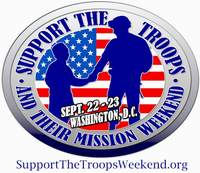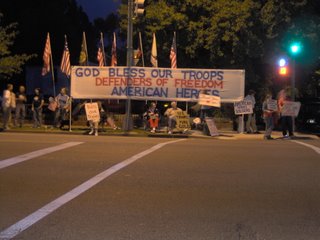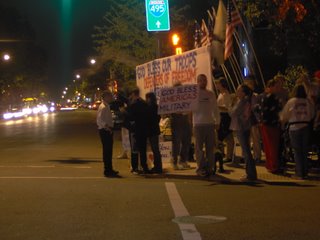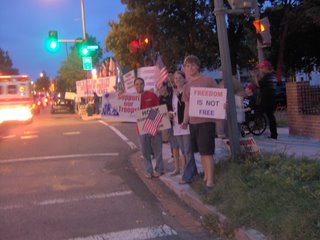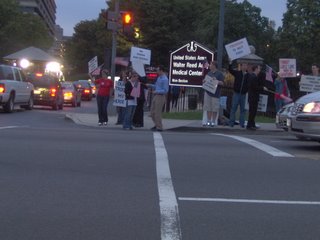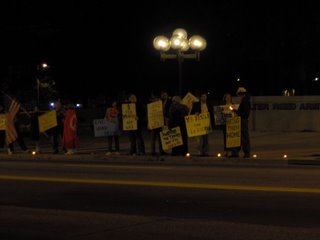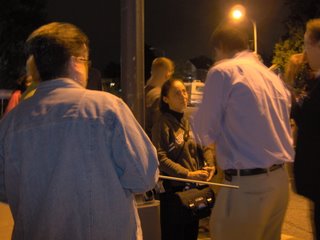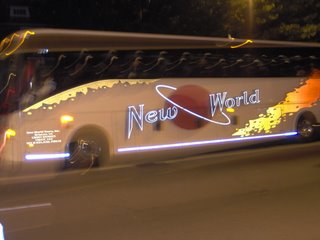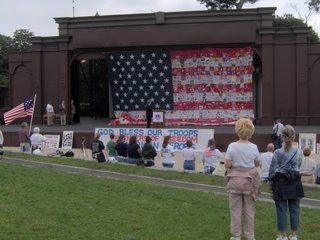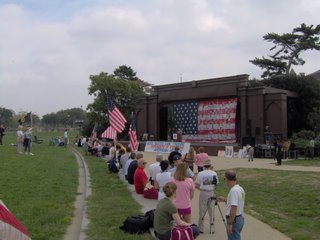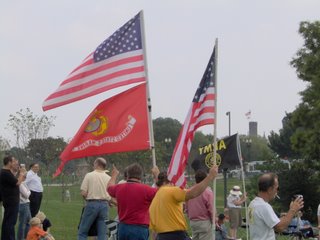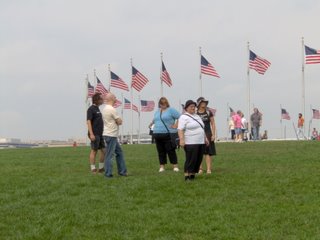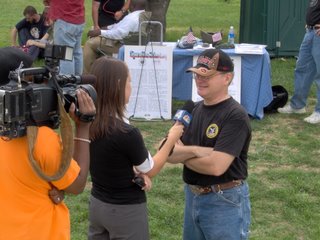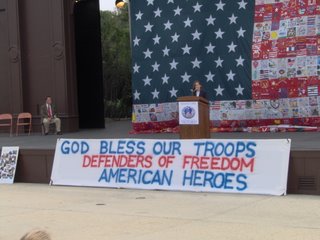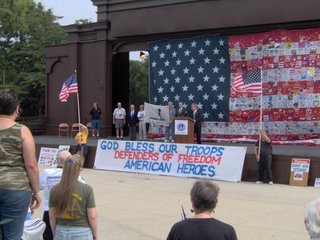An electoral tsunami in Belgium?
On October 8, municipal elections will take place in Belgium. Most attention will go to the result for the city of Antwerp, my hometown. Antwerp is, after the capital of Brussels, the biggest city of Flanders, the northern flemish-speaking part of Belgium and has about 450,000 inhabitants. (There are about 6 million Flemings). Its importance also derives from the trendsetting role Antwerp played for national politics in the past.
Antwerp, for two terms of six years already, is ruled by a rainbow-coalition of all parties except one: socialists (red), free-market liberals (blue), christian-democrats (orange) and environmentalists (green). The mayor is a socialist. But the biggest party, the far-right, anti-immigrant Vlaams Belang (VB - Flemish Interest), with 33% of the vote at the last local elections in 2000, has been excluded from the local government, as it is deemed a racist party, with which no other party wants to do business (the electoral system is based on proportional representation).
According to a recent poll, VB will increase its share of the vote to 38,6%. This increase can - in my opinion - be partly credited to the presence of a number of former liberals on the VB-candidate list. One of them was even put forward as a candidate for mayor of Antwerp by his previous party. This happened in the aftermath of the so-called VISA-crisis in 2003. Following allegations that city VISA cards were used to pay for private expenses (a handbag, furniture, a swimming pool, etc.) the socialist mayor and a number of city councillors resigned and a number of civil servants and police chiefs were suspended. Almost no criminal charges were presented in the end, but a stench of inappropriate conduct remained. After some political bickering between the coalition parties, where the liberals presented their - abovementioned - candidate for mayor "to enable a fresh start", in the end, a new socialist mayor took over. Later, the liberal candidate was expelled from his party for disagreeing when his party - at the national level - approved the extension of the right to vote to immigrants. For this, the liberal party was severely punished at the elections for the Flemish parliament in 2004. At the same time VB made a big leap forward, becoming the single biggest Flemish party. As had been the case in Antwerp in 2000 and 1994, all the other parties, except for the greens, were forced to build a coalition to keep VB from power at the Flemish level. It cannot be excluded that, after the national elections of June 2007, all the Flemish parties but the VB will also be required to have a majority at the national level.
Although the VB may win, it will most likely not win enough to reach an outright majority in the city council. In fact the most important question will probably be whether the greens will remain necessary for the present coalition. Most parties want to get rid of the greens as most of the time they behaved as an opposition within the city council. The VB however could get a majority in one or more of the less important borough councils (comparable to the boroughs of Manhatten, Queens, ... vs the city of New York).
While a participation of the VB in the government of big, important Antwerp has - barring a miracle - no chance at all, there were rumors that it could be invited to join a coalition in one of the smaller, less publicized municipalities surrounding Antwerp, e.g. by an incumbent mayor who wants to keep his job, but that remains to be seen.
It is widely expected that this election will be the last chance for the VB to 'win' Antwerp as the proportion of immigrants in the city population continues to rise. The tension between natives and immigrants, mostly Moroccans, has sometimes turned violent. In 2002, after a confused old man killed his young Moroccan neighbour, a teacher of Islam, Moroccan youths rioted in the borough of Borgerhout, clashing with police and smashing windows of cars and shops. In 2005, copying their brothers in France, a few cars were torched. In 2006, after a protest against the Danish cartoons, Moroccan youth rampaged through the city center, running over cars, smashing windows, mirrors and shouting "Allahu Akbar" and "Hamas". Also this year, an old man died after being hit by several Arab youths after he had admonished them to behave on the bus.
The VB's adversaries, sensing danger, have mobilized against the VB. Next Sunday, one week before the elections, concerts, officially "for tolerance, against racism, against extremism and against pointless violence", featuring the crème de la crème of the Flemish music scene, will be organized in several big cities, including Antwerp. Writers and artists have also mobilized. One of them, Luc Tuymans, this week warned for handing power to the VB issuing a veiled threat: "In the worst case you will get organised resistance, perhaps even rather violent reactions. I suspect many shop keepers will have their windows smashed. People do not seem to be aware, but a vote for the Vlaams Belang may have serious consequences. They should realize this before they take a final decision in the voting booth."
Giving credit where it is due, several commentators and politicians, including the mayor, have expressed reservations about the concerts: they could prove to be counterproductive, polarizing the city and giving a boost to the underdog. Personally, I believe they are right.
This weekend, a new poll will be released. If they show new trends, I will address them here. Meanwhile, I invite you for comments. I will also do a follow-up post after the elections.
Antwerp, for two terms of six years already, is ruled by a rainbow-coalition of all parties except one: socialists (red), free-market liberals (blue), christian-democrats (orange) and environmentalists (green). The mayor is a socialist. But the biggest party, the far-right, anti-immigrant Vlaams Belang (VB - Flemish Interest), with 33% of the vote at the last local elections in 2000, has been excluded from the local government, as it is deemed a racist party, with which no other party wants to do business (the electoral system is based on proportional representation).
According to a recent poll, VB will increase its share of the vote to 38,6%. This increase can - in my opinion - be partly credited to the presence of a number of former liberals on the VB-candidate list. One of them was even put forward as a candidate for mayor of Antwerp by his previous party. This happened in the aftermath of the so-called VISA-crisis in 2003. Following allegations that city VISA cards were used to pay for private expenses (a handbag, furniture, a swimming pool, etc.) the socialist mayor and a number of city councillors resigned and a number of civil servants and police chiefs were suspended. Almost no criminal charges were presented in the end, but a stench of inappropriate conduct remained. After some political bickering between the coalition parties, where the liberals presented their - abovementioned - candidate for mayor "to enable a fresh start", in the end, a new socialist mayor took over. Later, the liberal candidate was expelled from his party for disagreeing when his party - at the national level - approved the extension of the right to vote to immigrants. For this, the liberal party was severely punished at the elections for the Flemish parliament in 2004. At the same time VB made a big leap forward, becoming the single biggest Flemish party. As had been the case in Antwerp in 2000 and 1994, all the other parties, except for the greens, were forced to build a coalition to keep VB from power at the Flemish level. It cannot be excluded that, after the national elections of June 2007, all the Flemish parties but the VB will also be required to have a majority at the national level.
Although the VB may win, it will most likely not win enough to reach an outright majority in the city council. In fact the most important question will probably be whether the greens will remain necessary for the present coalition. Most parties want to get rid of the greens as most of the time they behaved as an opposition within the city council. The VB however could get a majority in one or more of the less important borough councils (comparable to the boroughs of Manhatten, Queens, ... vs the city of New York).
While a participation of the VB in the government of big, important Antwerp has - barring a miracle - no chance at all, there were rumors that it could be invited to join a coalition in one of the smaller, less publicized municipalities surrounding Antwerp, e.g. by an incumbent mayor who wants to keep his job, but that remains to be seen.
It is widely expected that this election will be the last chance for the VB to 'win' Antwerp as the proportion of immigrants in the city population continues to rise. The tension between natives and immigrants, mostly Moroccans, has sometimes turned violent. In 2002, after a confused old man killed his young Moroccan neighbour, a teacher of Islam, Moroccan youths rioted in the borough of Borgerhout, clashing with police and smashing windows of cars and shops. In 2005, copying their brothers in France, a few cars were torched. In 2006, after a protest against the Danish cartoons, Moroccan youth rampaged through the city center, running over cars, smashing windows, mirrors and shouting "Allahu Akbar" and "Hamas". Also this year, an old man died after being hit by several Arab youths after he had admonished them to behave on the bus.
The VB's adversaries, sensing danger, have mobilized against the VB. Next Sunday, one week before the elections, concerts, officially "for tolerance, against racism, against extremism and against pointless violence", featuring the crème de la crème of the Flemish music scene, will be organized in several big cities, including Antwerp. Writers and artists have also mobilized. One of them, Luc Tuymans, this week warned for handing power to the VB issuing a veiled threat: "In the worst case you will get organised resistance, perhaps even rather violent reactions. I suspect many shop keepers will have their windows smashed. People do not seem to be aware, but a vote for the Vlaams Belang may have serious consequences. They should realize this before they take a final decision in the voting booth."
Giving credit where it is due, several commentators and politicians, including the mayor, have expressed reservations about the concerts: they could prove to be counterproductive, polarizing the city and giving a boost to the underdog. Personally, I believe they are right.
This weekend, a new poll will be released. If they show new trends, I will address them here. Meanwhile, I invite you for comments. I will also do a follow-up post after the elections.
